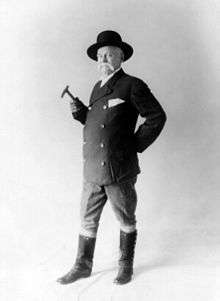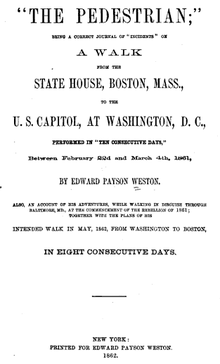Edward Payson Weston
Edward Payson Weston (1839–1929) was a notable pedestrian, who was largely responsible for the rise in popularity of the sport in the 1860s and 1870s.

Biography
Edward Payson Weston was born on March 15, 1839 in Providence, Rhode Island to Silas Weston, a teacher and publisher, and Maria Gaines, a writer. As a teenager, Weston published books about his father's trips to the California Gold Rush and to the Azores, and he also published a novel written by his mother in 1859.[1] During childhood Weston moved frequently, and by his own account, spent some time travelling with the popular Hutchinson Family Singers.[2]
He first received attention as a notable pedestrian in 1861, when he walked 478 miles (769 km) from Boston, Massachusetts to Washington, D.C. in 10 days and 10 hours, from February 22 to March 4. During the walk, he faced snow, rain, and mud, and he fell several times. His longest period of uninterrupted sleep was 6 hours, and he usually ate while walking. He arrived in Washington at 5:00 pm, and was strong enough to attend Abraham Lincoln's inaugural ball that evening.

The walk was part of the terms of a bet on the 1860 presidential election. The bettor whose candidate lost was to walk to Washington to see the inauguration of the new president. Weston lost when he bet against Lincoln, and received only a bag of peanuts for his trouble. However, he also received newspaper coverage and a congratulatory handshake from the new president, which inspired him to further pedestrian feats.
In 1867, Weston walked from Portland, Maine to Chicago, Illinois, covering over 1200 miles (1900 km) in 26 days, winning a prize of $10,000. He received several death threats from gamblers who had bet against him, and was attacked once. He gave lectures to crowds of spectators on the health benefits of walking, both during the walk and afterwards.
Over the next few decades, Weston continued his professional walking career. While he was sometimes beaten in indoor multiday races, he held numerous records for long-distance endurance events. In 1869 he walked 1058 miles (1703 km) through snow-covered New England in 30 days. In 1871, he walked backwards for 200 miles around St. Louis, Missouri in 41 hours.
Weston spent 8 years touring Europe, starting in 1876 in England where he challenged England's racewalking champion to a 24-hour, 115 mile ultramarathon. The Englishman quit 14 hours and 65.6 miles into the race, but Weston walked the full 24 hours and covered 109.5 miles. His performance caused a bit of a controversy when he later admitted to having been chewing coca leaf throughout much of the race.[3]
In 1879 he defeated the British champion "Blower" Brown, in a 550-mile (890 km) match which he walked in 141 hours 44 minutes, winning him the prestigious Astley Belt.
In April 1906, Weston walked from Philadelphia to New York, a distance of over 100 miles, in less than 24 hours.[4]
In 1907, at the age of 68, Weston repeated his Maine-to-Chicago walk of 1867, beating his own time by over 24 hours. In 1909, he walked 4,000 miles, from New York to San Francisco, in 100 days.[5][6]
His last great journey was in 1913, when he walked 1546 miles (2488 km) from New York to Minneapolis in 51 days.
Weston spent most of the remainder of his life urging others to take up walking for exercise and competition. He warned that automobiles were making people lazy and sedentary.
Death
Weston was severely injured when he was struck by a New York City taxicab in 1927, and never walked again. He died in his sleep two years later.
Legacy
His life story has been told in the 2012 biography, A Man in a Hurry,[7] described by U.S. sports writer Brian Phillips as "a spectacularly entertaining book."[8] His career biography, "Weston, Weston, Rah-Rah-Rah!", was also published in 2012.[9]
References
- "Edward Payson Weston". Rhode Island Heritage Hall of Fame.
- Weston. 1861; p.47.
- Steven B. Karch. A Brief History of Cocaine, 2nd Edition. This story can be found online in a preview of the book.
- Peck, Wiliam F. (1908). History of Rochester and Monroe County. Pioneer Publishing Company. p. 108. Retrieved 2009-08-25.
- "Heat and Insects Compel Pedestrian to Take Day Off". The New York Times. April 3, 1909. Retrieved 2008-05-26.
- "Weston's Auto Lost, Needs His Supplies". The New York Times. June 30, 1909. Retrieved 2008-05-26.
Veteran Suffers Chiefly From Lack Of Proper Attention On Road. Best Day's Walk Of Task Notwithstanding Hardships The Old Pedestrian Says He Never Felt Better Or Stronger. Lost. One automobile, one chauffeur, and one trained nurse; incidentally several suits of underclothes, three pairs of boots, dozen pairs of socks, two dozen handkerchiefs, two white garabaldis, one oilskin coat, and one straw hat. All belong to Edward Payson Weston, en route from New York to San Francisco via a devious route, over sundry obstacles, chiefly clay mud, knee deep, and still becoming deeper.
- Harris, Nick; Harris, Helen; Marshall, Paul (2012). A Man in a Hurry: The Extraordinary Life & Times of Edward Payson Weston, the World's Greatest Walker. London: de Coubertin. ISBN 0956431372.
- Phillips, Brian (7 September 2012). "Pedestrian Mania". Grantland. Retrieved 2012-09-06.
- Marshall, P.S. (2012). "Weston, Weston, Rah-Rah-Rah!" : Edward Payson Weston: The Original Sporting Superstar! : A Career Biography. Bloomington, IN: Authorhouse. ISBN 9781477215074.
External links
- Edward Payson Weston at Flickr Commons
Further reading
- Edward Payson Weston. The pedestrian: being a correct journal of "incidents" on a walk from the state house, Boston, Massachusetts, to the U.S. Capitol, at Washington, D.C., performed in "ten consecutive days", between February 22d and March 4, 1861. NY: E.P. Weston, 1862
- King of the Peds - by P.S. Marshall (Authorhouse, 2008)
- A Man in a Hurry - The Extraordinary Life and Times of Edward Payson Weston, the World's Greatest Walker by Nick Harris, Helen Harris and Paul Marshall (De Coubertin, 2012)
- "Weston, Weston, Rah-Rah-Rah!" - Edward Payson Weston - The Original Sporting Superstar! - A Career Biography - by P.S. Marshall (Authorhouse, 2012)